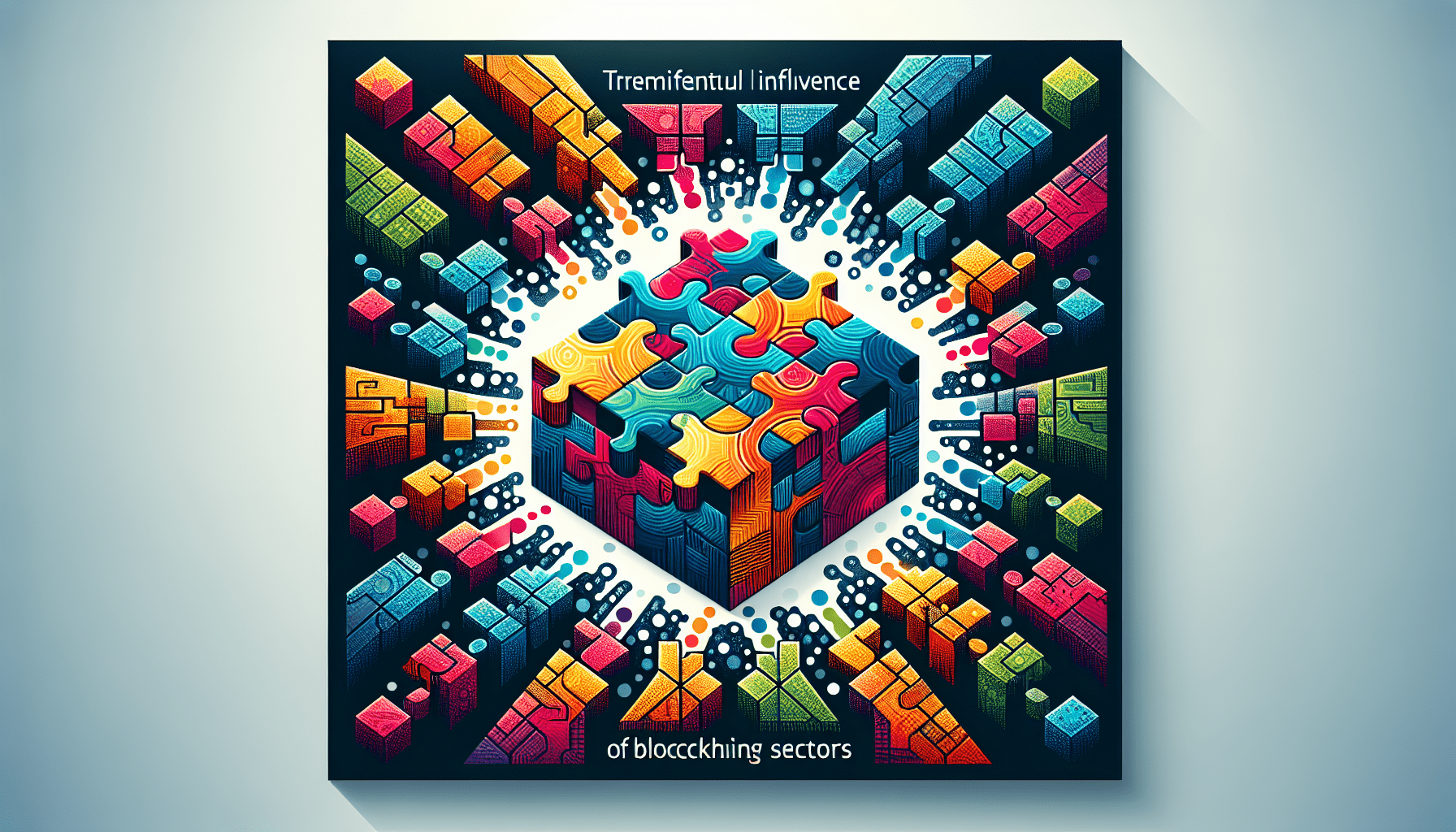In this article, we will explore the exciting possibilities that arise from the integration of blockchain technology into different industries. As blockchain continues to gain popularity, its potential to revolutionize business processes is becoming increasingly evident. From finance to healthcare, supply chain management to cybersecurity, we will delve into how blockchain can transform various sectors, enhancing transparency, security, and efficiency. So, fasten your seatbelts as we embark on a journey to discover how this groundbreaking technology is reshaping the future of industries worldwide.
Finance
Cross-border payments
Blockchain technology has the potential to revolutionize cross-border payments by providing a more efficient and secure way to transfer funds internationally. Traditional methods of transferring money between different countries can be time-consuming, expensive, and subject to high transaction fees. However, with blockchain technology, transactions can be completed in real-time, eliminating the need for intermediaries such as banks. This not only reduces costs but also increases transparency and reduces the risk of fraud. Therefore, individuals and businesses can benefit from faster, cheaper, and more secure cross-border payments.
Smart contracts
Smart contracts are self-executing contracts that automatically execute predefined actions when certain conditions are met. The integration of blockchain technology in finance will enable the widespread adoption of smart contracts, streamlining and automating various financial processes. For example, by using smart contracts, the process of purchasing a property can be simplified and made more secure. The contract would automatically transfer ownership rights to the buyer once the required payment is made and verified on the blockchain. This eliminates the need for intermediaries and reduces the possibility of fraud.
Fraud prevention
Blockchain technology has the potential to significantly reduce fraud in the financial industry. Due to its decentralized nature, all transactions recorded on the blockchain are transparent and immutable, making it difficult for fraudulent activities to go unnoticed. Additionally, the use of cryptographic hash functions and advanced encryption techniques ensures that data stored on the blockchain remains tamper-proof. By implementing blockchain solutions, financial institutions can strengthen their security measures and protect against identity theft, money laundering, and other fraudulent activities.
Supply Chain Management
Traceability and transparency
Blockchain technology can greatly enhance traceability and transparency in the supply chain management process. By recording every transaction and movement of goods on a decentralized ledger, companies can ensure that all information about a product’s origin, manufacturing process, and transportation is easily accessible and verifiable. This enables consumers and businesses to make informed decisions and supports ethical and sustainable practices. Additionally, the transparency provided by blockchain technology can help prevent the circulation of counterfeit or substandard products in the market.
Efficient inventory management
Blockchain technology can streamline inventory management by providing a real-time and accurate view of inventory levels across the entire supply chain. With the implementation of blockchain-based systems, companies can track inventory movements, update stock levels automatically, and optimize warehouse operations. This reduces the risk of overstocking or understocking, minimizes the chances of stockouts, and ultimately improves customer satisfaction. Additionally, by automating inventory management processes, companies can reduce costs and increase efficiency.
Counterfeit prevention
Counterfeit products pose a significant threat to companies and consumers alike. Blockchain technology can help address this issue by providing a secure and tamper-proof record of a product’s journey from the manufacturer to the end consumer. By utilizing unique identifiers, such as QR codes or RFID tags, companies can track and verify the authenticity of each product on the blockchain. This ensures that consumers receive genuine products, protects brand reputation, and helps combat the global issue of counterfeiting.
Healthcare
Secure health records
Blockchain technology can revolutionize the healthcare industry by providing a secure and interoperable platform for storing and sharing patient health records. Current healthcare systems often suffer from fragmentation and lack of interoperability, making it difficult for healthcare providers to access accurate and complete patient information. By utilizing blockchain technology, patient health records can be securely stored on a decentralized ledger, enabling authorized healthcare professionals to access and update patient information in real-time. This improves the quality of care, reduces medical errors, and enhances patient privacy.
Improved interoperability
Interoperability refers to the ability of different healthcare systems and applications to communicate and exchange data seamlessly. Blockchain technology can improve interoperability by providing a standardized and secure platform for data exchange. By using blockchain-based health information exchanges, healthcare providers can securely share patient data across different platforms, ensuring that the right information is available to the right people at the right time. This enables better coordination of care, reduces duplicative testing, and improves overall healthcare outcomes.
Drug traceability
The pharmaceutical industry faces challenges in ensuring the authenticity and safety of drugs throughout the supply chain. Blockchain technology can enhance drug traceability by recording every transaction involving pharmaceutical products on an immutable ledger. This enables manufacturers, distributors, and other stakeholders to verify the authenticity and provenance of drugs, preventing the circulation of counterfeit or substandard products. By improving drug traceability, blockchain technology can protect patient safety, reduce the risk of drug recalls, and enhance regulatory compliance in the pharmaceutical industry.
Real Estate
Transparent property transactions
The integration of blockchain technology in the real estate industry can bring transparency and efficiency to property transactions. Currently, the process of buying and selling property involves multiple intermediaries, such as real estate agents, lawyers, and banks, leading to delays, high costs, and potential fraud. By utilizing blockchain-based systems, property transactions can be recorded on a transparent and immutable ledger, eliminating the need for intermediaries and reducing the risk of fraudulent activities. This streamlines the process, reduces costs, and provides a higher level of trust for all parties involved.
Efficient land registry
Maintaining accurate land registries is crucial for the real estate industry. Blockchain technology can provide a decentralized and tamper-proof platform for recording and managing land ownership information. By storing land registry data on the blockchain, the risk of fraudulent activities, such as double-spending or unauthorized land transfers, can be significantly reduced. Additionally, the use of smart contracts can automate the process of transferring property ownership, simplifying and expediting the overall land registry process.
Streamlined property management
Property management involves various tasks, such as rent collection, maintenance requests, and lease agreements. By integrating blockchain technology, these processes can be streamlined and made more efficient. For example, smart contracts can automate rental payments, ensuring that landlords receive payments on time and tenants can easily track their payment history. Additionally, blockchain-based platforms can facilitate transparent communication between landlords and tenants, enabling quick and efficient resolution of maintenance requests. This improves overall property management and enhances the renting experience for both landlords and tenants.
Insurance
Automated claims processing
Claims processing is a time-consuming and complex task for insurance companies. Blockchain technology can automate and streamline this process, reducing the administrative burden and improving efficiency. By utilizing smart contracts, insurance policies and claims can be automatically verified, validated, and settled. This eliminates the need for manual intervention, reduces the risk of human error, and speeds up the claims settlement process. Additionally, the transparency provided by blockchain technology ensures that all parties involved have access to the same information, reducing the potential for disputes.
Fraud detection
Insurance fraud is a significant problem that affects both insurers and policyholders. Blockchain technology can enhance fraud detection in the insurance industry by providing a transparent and immutable record of all transactions and claims. By analyzing the data stored on the blockchain, insurers can detect patterns and anomalies that may indicate fraudulent activities. Additionally, the use of smart contracts can automate the verification process, ensuring that only valid claims are processed. This helps insurers reduce the financial impact of fraudulent claims and provides policyholders with a more secure and reliable insurance experience.
Enhanced customer experience
Blockchain technology can transform the customer experience in the insurance industry by providing greater transparency, efficiency, and security. By utilizing blockchain-based platforms, insurers can provide real-time access to policy information, claims status, and coverage details, empowering policyholders to make informed decisions. Additionally, the automation of insurance processes through smart contracts reduces the need for lengthy paperwork and manual intervention, resulting in a smoother and faster customer experience. By leveraging blockchain technology, insurers can improve customer satisfaction and build stronger relationships with policyholders.
Energy
Decentralized energy trading
The integration of blockchain technology in the energy sector can enable decentralized energy trading, allowing consumers to buy and sell energy directly with each other. Traditionally, energy trading is controlled by centralized entities, such as utilities or energy suppliers. However, blockchain technology enables the creation of peer-to-peer energy trading platforms, where producers can sell excess energy to consumers in a transparent and secure manner. This decentralization increases market competition, reduces energy costs, and promotes the use of renewable energy sources.
Grid management
Maintaining a stable and efficient energy grid is crucial for the energy sector. Blockchain technology can enhance grid management by enabling the real-time monitoring and optimization of energy distribution. By integrating blockchain-based platforms with IoT devices and smart meters, energy consumption and production data can be securely recorded and shared on a decentralized ledger. This allows grid operators to efficiently allocate energy resources, balance supply and demand, and reduce wastage. Ultimately, blockchain technology improves the resilience and reliability of the energy grid, supporting the transition to a more sustainable energy system.
Electric vehicle charging
The increasing adoption of electric vehicles (EVs) brings new challenges for the energy sector, particularly in terms of managing and charging EV batteries efficiently. Blockchain technology can facilitate EV charging by providing a secure and transparent platform for recording and managing charging transactions. By using blockchain-based systems, EV owners can easily locate available charging stations, make payments seamlessly, and track their charging history. Additionally, the decentralized nature of blockchain ensures interoperability between different charging networks, making it more convenient for EV users to charge their vehicles.

Education
Verifiable credentials
Blockchain technology can revolutionize the education sector by providing a secure and tamper-proof platform for storing and sharing educational credentials. Currently, the verification process for academic degrees and certifications can be cumbersome and time-consuming. By utilizing blockchain-based systems, educational institutions can issue verifiable credentials that are stored on a decentralized ledger. This enables employers and other institutions to easily verify the authenticity and validity of educational credentials, streamlining the hiring process and reducing the risk of credential fraud.
Copyright protection
The digital age has brought challenges to the protection of intellectual property rights, particularly in the education sector where online content is widely shared. Blockchain technology can address this issue by providing a transparent and immutable record of ownership and creation. By registering digital content on the blockchain, creators and educators can establish proof of authorship and protect their intellectual property rights. Additionally, the decentralized nature of blockchain ensures that the ownership of digital content cannot be disputed, providing creators with greater control over their work and promoting innovation in the education sector.
Smart contracts for course enrollment
The process of enrolling in courses and managing course payments can be time-consuming and inefficient in the education sector. Blockchain technology can simplify and automate this process through the use of smart contracts. By utilizing blockchain-based platforms, students can easily browse and select courses, make payments securely, and receive automated confirmation of enrollment. Additionally, the use of smart contracts ensures that course providers receive timely payments and can accurately track course enrollments. This improves the overall efficiency of course enrollment and enhances the student experience.
Government
Secure identity management
Blockchain technology can revolutionize identity management in the government sector by providing a secure and decentralized platform for storing and validating personal information. By utilizing blockchain-based identity systems, individuals can have greater control over their personal data, ensuring privacy and protection against identity theft. Additionally, the immutability of the blockchain ensures that identity records cannot be tampered with, reducing the risk of fraud and enabling more secure access to government services. Furthermore, blockchain technology can facilitate seamless and secure data sharing between government agencies, improving overall efficiency and service delivery.
Transparent voting systems
Ensuring the integrity and transparency of voting systems is essential for a healthy democracy. Blockchain technology can enhance voting systems by providing a transparent and immutable record of every vote cast. By utilizing blockchain-based voting platforms, voters can verify that their vote has been recorded accurately and securely. Additionally, the decentralized nature of blockchain ensures that the voting process is resistant to manipulation and fraud. By leveraging blockchain technology, governments can enhance trust in the electoral process, increase voter participation, and strengthen democracy.
Efficient public services
Blockchain technology can streamline and improve the delivery of public services by providing a secure and transparent platform for recording and managing government transactions. By utilizing blockchain-based systems, governments can automate and streamline processes such as license issuance, permit applications, and benefit distribution. This reduces bureaucracy, eliminates the need for intermediaries, and improves the overall efficiency and transparency of public service delivery. Additionally, the decentralized nature of blockchain ensures that government records remain tamper-proof and accessible to authorized individuals, enhancing trust in public institutions.

Retail
Improved supply chain traceability
The integration of blockchain technology in the retail industry can enhance supply chain traceability, enabling consumers to track the journey of products from the point of origin to the point of sale. By recording every transaction and movement of goods on the blockchain, retailers can provide transparent and reliable information about a product’s provenance, manufacturing process, and transportation. This empowers consumers to make informed decisions and supports ethical and sustainable practices. Additionally, by improving supply chain traceability, blockchain technology helps retailers identify and address issues such as product recalls or quality control problems more efficiently.
Enhanced customer loyalty programs
Customer loyalty programs are widely used in the retail industry to incentivize customer loyalty and repeat purchases. Blockchain technology can enhance these programs by providing a secure and transparent platform for managing customer loyalty points. By utilizing blockchain-based loyalty programs, retailers can ensure that loyalty points are securely recorded and easily redeemable by customers. Additionally, the transparency provided by blockchain technology ensures that loyalty points cannot be manipulated or fraudulently obtained. This enhances the overall customer experience and strengthens customer loyalty.
Prevention of counterfeit products
Counterfeit products pose a significant threat to retailers and consumers alike. Blockchain technology can help address this issue by providing a secure and transparent record of a product’s journey from the manufacturer to the end consumer. By utilizing unique identifiers, such as QR codes or RFID tags, retailers can track and verify the authenticity of each product on the blockchain. This ensures that consumers receive genuine products, protects brand reputation, and helps combat the global issue of counterfeiting. By leveraging blockchain technology, retailers can enhance consumer trust and ensure the integrity of their products.
Transportation and Logistics
Efficient logistics tracking
Efficient logistics tracking is crucial for the transportation and logistics industry. Blockchain technology can enhance logistics tracking by providing a decentralized and transparent platform for recording and sharing logistics information. By utilizing blockchain-based systems, companies can track the movement of goods in real-time, ensuring transparency and accuracy throughout the supply chain. This reduces administrative costs, improves inventory management, and enhances overall efficiency in transportation and logistics operations. Additionally, the transparency provided by blockchain technology helps prevent shipment delays, theft, or loss of goods.
Automated freight payments
The process of freight payments involves multiple parties, complex documentation, and lengthy settlement processes. Blockchain technology can automate and streamline freight payments by utilizing smart contracts. By recording payment terms and conditions on the blockchain, smart contracts can automatically execute payment transactions once predefined conditions are met. This eliminates the need for intermediaries, reduces paperwork, and speeds up the payment settlement process. Additionally, the transparency and immutability of blockchain ensures that payment records are tamper-proof and can be easily audited, improving overall financial transparency in the transportation and logistics industry.
Secure driver records
Maintaining accurate and up-to-date driver records is essential for the transportation and logistics industry. Blockchain technology can provide a secure and tamper-proof platform for recording and managing driver records, such as licenses, certifications, and employment history. By utilizing blockchain-based systems, companies can ensure that driver records are easily accessible, up-to-date, and verified. This improves the hiring process, reduces the risk of non-compliance with regulatory requirements, and enhances overall safety in the transportation and logistics industry. Additionally, the decentralized nature of blockchain ensures that driver records cannot be manipulated or falsified.



